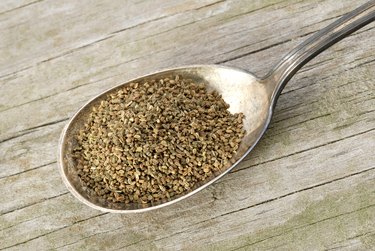
If you've ever experienced the pain, swelling and heat of a gout flare-up, you've had good reason to seek immediate relief. But although there are historical and scientific hints that celery seed may be useful for treating gout, more research is needed to develop clinical proof of that.
Tip
Although historical sources and animal studies suggest that celery seed might be useful for treating arthritis and gout, no human studies have yet proven this.
Video of the Day
Celery Seed Extract for Gout?
The idea of using celery seed extract for gout isn't a passing fancy. In fact, as the University of Arizona notes, celery seed was originally cultivated for medicinal purposes — not food — and the Ayurvedic tradition has long made use of celery seed to treat a number of conditions, including colds, flu and various types of arthritis.
Video of the Day
However, there are no peer-reviewed clinical studies available that show celery seed's full range of effects in humans — and only limited animal studies available to hint at what might be possible.
Celery seed is also an ingredient that may show up in your food — so how dangerous could it be? Unless you have food allergies or your doctor has cautioned you against including certain foods in your diet, there's no reason not to eat celery seed in the typical amounts you'd find in many dishes.
However, once you start taking herbal extracts for supplemental or medicinal purposes, they may be strong enough to cause adverse effects and unexpected interactions with medications or other supplements. And, just as important, it's hard to be sure exactly what you're getting in that supplement bottle.
An unsettling analysis of nearly 800 supplements that the FDA had identified as being adulterated, published in October 2018 in JAMA Network Open, found that almost 80 percent of the supplements contained an unapproved pharmaceutical ingredient. Some contained multiple unapproved ingredients, and still others were found to have new unapproved ingredients upon repeat evaluation.
If ever there were a case for getting as much nutrition as possible from a varied diet instead of a supplement bottle, that's it. Of course, that doesn't mean that you should never take dietary supplements — but it does reinforce the importance of relying on solid science to help you determine which supplements are worth taking.
Read more: List of Top Vitamin Brands
Animal Studies Show Promise
Although there are no published, peer-reviewed clinical studies on human subjects regarding the use of celery seed for treating gout or other types of arthritis, animal studies suggest it does work. A single study of mice, published in the November 2019 issue of Molecular Medicine Reports, suggests that aqueous and oil extracts of celery seed might have anti-gout properties, thanks at least in part to their anti-inflammatory and antioxidative effects.
An older rodent-based study, published in the March 2008 issue of the Polish Journal of Food and Nutrition Sciences, remains noteworthy because it studied the effects of several types of celery seed extract on uric acid levels.
The researchers reported that both the celery seed extracts and the other herbs studied — including cinnamon, turmeric and rosemary — all lowered uric acid levels in both plasma and urine.
However, none of those studies mean you should run right out and add celery seed supplements to your current regimen. A suggestion of anti-gout properties isn't the same as confirmation of those properties — and much more research is needed to confirm the effects of celery seed extract for gout. Research is also needed to determine whether there are any adverse effects associated with taking celery seed oil for gout, or any other extract form.
Start Taking Celery Seed Supplements?
Of course, that doesn't mean you should run away the next time you see celery seed or its extract versions on the shelf, either. Instead, do what a broad swath of medical authorities — including the American Academy of Family Physicians — recommend, and talk to your doctor before you start taking any new supplements, including celery seed capsules for gout.
That's particularly important if you're dealing with an acute or chronic medical condition — such as gout — or taking prescription medications, because those supplements can produce unexpected interactions. Just as important, your doctor can supply the missing pieces to help you leverage new research information and decide when, or if, it's worth trying celery seed extracts as part of your gout treatment.
Your doctor may also recommend other strategies — such as reducing your intake of foods high in purines, which, as the Arthritis Foundation explains, can raise uric acid levels and potentially provoke a gout flare-up.
Read more: What Vegetables Should Gout Sufferers Avoid?
- University of Arizona, College of Agriculture and Life Sciences: "Celery Seed"
- Molecular Medicine Reports: "Anti-Gouty Arthritis and Anti-Hyperuricemia Properties of Celery Seed Extracts in Rodent Models"
- Polish Journal of Food and Nutrition Sciences: "Evaluation of Anti-Gout Activity of Some Plant Food Extracts"
- American Academy of Family Physicians: "Dietary Supplements: What You Need to Know"
- JAMA Network Open: "Unapproved Pharmaceutical Ingredients Included in Dietary Supplements Associated With US Food and Drug Administration Warnings"
- Arthritis Foundation: "Which Foods Are Safe for Gout?"